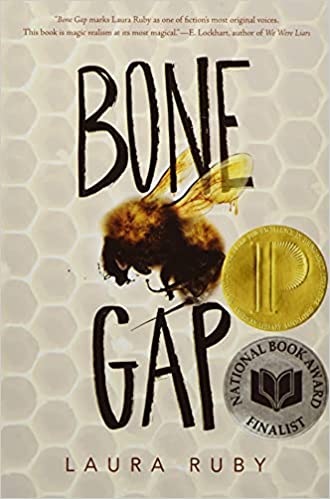Blog: Bad Boys and Worse Verse: Hades and Persephone in Translation, from Ovid’s Metamorphoses to Young/New Adult Fiction
By ToriLee | September 26, 2023
Blog: Calliope’s Library: Books for Young Readers
By Krishni Burns | November 8, 2021
Do you know any kids? Do they like books? Do you want to lure them down the path of Classical Studies before paleontology fever sets in? The good news is that there’s a new resource in development to help you do just that. I’m please to introduce Calliope’s Library: Books for Young Readers.

Figure 1: Bone Gap, by Laura Ruby. Krishni Burns writes, “I appreciate a modern-day Persephone who sets the curtains on fire to get the fire department’s attention, because trapped isn’t the same as helpless.”
Blog: Weaving Humanity Together: How Weaving Reveals Human Unity in Ancient Times
By Anika T. Prather | June 2, 2021
Blog: Weaving Humanity Together: How Weaving Reveals Human Unity in Ancient Times
To start with, she lived a respectable life, frugal and hard;
she earned her living by weaving and spinning wool.primum haec pudice uitam parce ac duriter
agebat, lana ac tela uictum quaeritans.— Terence the African (P. Terentius Afer), The Girl from Andros, 74–75
This line drew my attention because I am an avid fiber artist. When I am not reading, teaching, and writing about Classics and its connection to Black people, I am in my wool room, lost in the magical world of fiber arts. This line from The Girl from Andros has led me on a new journey of discovering fiber arts in ancient times.
Blog: Ancient Worlds, Modern Communities: Ancient Worlds through Modern Podcasts
By Nina Papathanasopoulou | March 26, 2021
The Classics Everywhere initiative, launched by the SCS in 2019, in March 2021 has been renamed and reimagined as the Ancient Worlds, Modern Communities initiative. Ancient Worlds, Modern Communities supports projects that seek to engage broader publics—individuals, groups, and communities—in critical discussion of and creative expression related to the ancient Mediterranean, the global reception of Greek and Roman culture, and the history of teaching and scholarship in the field of classical studies.
Blog: Truth Behind Myth: Video Games and the Recreation of the Trojan War
By Peter Gainsford | October 23, 2020
August 2020 saw the release of A Total War Saga: Troy, a strategy video game where the player takes on the role of one of various heroes on either side of the Trojan War and leads their armies to victory. If you’ve ever wanted to play Penthesilea defeating Achilles, here’s your chance.
Blog: Dissertation Spotlight: Understanding Mythological Embodiments of Emotion
By Yoandy Cabrera Ortega | June 13, 2019
This month, we spotlight the graduate research of Dr. Yoandy Cabrera Ortega, who recently defended his dissertation on the portrayal of human emotions in ancient Greek myths and in modern literature from Spain and Latin America.
My dissertation was an interdisciplinary one, intertwining different approaches and fields such as classical reception, queer studies, affect theory, and Hispanic studies.
Amphora: Labors and Lesson Plans—Educating Young Hercules in Two 1990s Children’s Television Programs
By Angeline Chiu | September 11, 2017
This article was originally published in Amphora 11.1. It has been edited slightly to adhere to current SCS blog conventions.
Amphora: Eurydice by Sarah Ruhl—The Power of Pretense
By Victoria Pagán | May 8, 2017
This article was originally published in Amphora (12.1). It has been edited slightly to adhere to current SCS blog conventions.
Amphora: Tartarus and the Curses of Percy Jackson (or Annabeth’s Adventures in the Underworld)
By Tom Kohn | April 10, 2017
This article was originally published in Amphora 12.1. It has been edited slightly to adhere to current SCS blog conventions.
Panorama or zoom? Two methods of teaching Myth
By T. H. M. Gellar-Goad | February 17, 2014
Greek Myth is one of the standbys of Classics general-education courses at colleges and universities across the United States. These courses often have high enrollments and are populated by students with little prior knowledge about the ancient Mediterranean world who are taking the course to fulfill a degree requirement. They may take Myth because of a lifelong interest in the stories (or because they’ve read the Percy Jackson series), they may be inspired to major in Classics by the course, or they may never read or think about Graeco-Roman culture after the term ends.
A common way of teaching the Myth survey course is like a panorama, a wide-angle shot that tries to fit in as much content as possible from a high-altitude perspective. I took a different approach in my fall 2013 Greek Myth course at Wake Forest University — a closeup, zooming in on one specific ancient myth-cycle in elaborate detail. Rather than try to cover Graeco-Roman mythology from Chaos to Romulus, encountering tidbits of art and literature from Homer to Ovid, my course focused on just one mythic figure, and students studied every major visual and textual treatment of that figure that survives from the ancient world.
The myth-cycle I selected was Herakles/Hercules.
